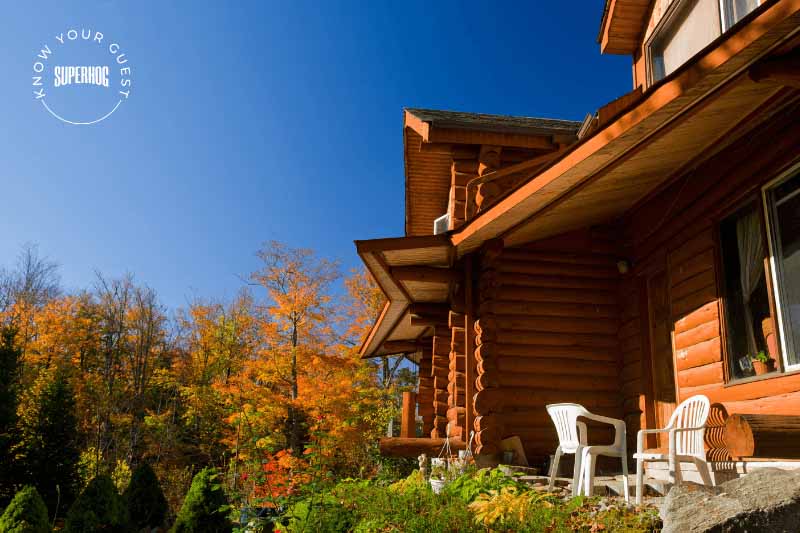Establishing a clear vision for your short-term rental business will set you up for success. Incorporate these 15 tips – including how to use Airbnb to help build your vacation rental brand – to elevate your branding strategy, build trust and loyalty with your guests and encourage repeat business.
Short-term rental marketing should start with your branding. As a vacation rental owner, you can use your brand to persuade potential guests to choose your home over another.
So, how do you successfully define your business as a brand and establish yourself as a reputable host in the industry?
In this article, we will show you how to build a brand for your vacation rental business and share:
Why your vacation rental business needs a brand identity
Building a vacation rental brand isn’t just a desirable means to come back to in the future. It should be set in stone from the offset.
Why? Because setting a clear vision of your business will greatly benefit your guests and your success.
Other reasons you should invest in your brand strategy include:
- It builds trust and loyalty
- You can distinguish yourself from the competition
- Added value
- Sets expectations for you and your guests
Build loyalty and trust
Trust is the foundation of any relationship. A consumer who does not trust your brand, will not complete a transaction with you, no matter what industry you are in.
Your branding can help guests associate trust and loyalty with your business and create customer advocacy.
To build that trust, you also need to ensure you’re consistently providing outstanding guest experience and a rental property that exceeds expectations.
Distinguish yourself from the competition
With the staggering growth of Airbnb and new booking platforms appearing, guests now have more choices than ever.
As a vacation rental owner, it’s important to differentiate yourself from the competition. So, what makes your vacation rental business special?
By building your brand, you will create an identity that sets you apart from other short-term rental businesses – your brand identity should be recognisable, trusted and not be confused with your competitors.
Branding builds value
Guests will be more likely to associate your brand with a specific niche when the branding is done well. It will speak volumes for your business.
Also, when you encompass a certain level of quality within your brand, products and services, guests are more inclined to pay higher fees.
Sets expectations
How you present your short-term rental business from the outset will help you set expectations for you and your guests. Your branding is a great marketing tool that will help communicate your brand values and attract your target audience.

How to build your vacation rental brand
1. Deep dive into your target audience
Research your ideal guest and understand what their expectations are so that you can ensure you consistently hit the mark each and every time.
Top tip: Creating brand personas will help you identify your ideal customer’s pain points and expectations
2. Analyse your fellow vacation rental competitors
You should know your competitors: what they offer, how they offer it, and what their USP (unique selling point) is. What you learn will enable you to grasp what your unique offering is and set your branding apart.
For competitor research, Google can be your favourite tool. Consider looking into:
- Who appears first on Google when you type in vacation rentals near + your area? This will help you identify local companies and competitors, where you can deep dive into what they are offering.
- Who appears first on the various listing and booking platforms you use? Again look into what amenities they offer, what they do well and what you think you can do better
- Explore vacation rental websites – get a feel for how a guest would navigate and potentially book a property
3. Pick your niche
Narrow down on a specific segment in the market and know what your unique selling point is. This will help build your brand.
Your niche could be:
- Eco-friendly rentals
- Pet-friendly rentals
- Ultra-luxury rentals
- Business travellers
4. Choose your business name and identity
Your vacation rental name is what your guests will remember, but it’s not always easy to come up with a business name, especially in an industry with lots of competition. You will need to do your research and ensure your business name pairs well with your brand identity and target audience.
5. Write your tagline
Remember that your tagline will be displayed on various mediums including your website, social media profiles, and advertisements and is another marketing tool for you to utilise.
These should be short, catchy and a strong representation of your brand values.
6. Select your colours and visuals and design your logo
Choose colours that align with your brand. Colour psychology can be a useful strategy to consider as it focuses on how colours impact a consumer’s impression of a brand.
For example, blue is considered a colour that represents trust, peace and loyalty.
7. Brand consistency
Be consistent with your branding at all times. This includes communications with guests, your presence on social media, your website and external marketing materials.
Brand consistency does not just include how your brand visually looks, but also how you treat your customers throughout the whole buyer journey. This means it is important you remain consistent in the way you handle guests pre and post-checkout.

How to use Airbnb to help build your vacation rental brand
Airbnb is a great booking platform to use to help build your exposure as a vacation rental host. This can be a useful tool to initially attract guests to your vacation rental properties.
Build a rapport with your guests and create a great guest experience to foster guest loyalty and attract these guests to book again with you.
However, instead of using Airbnb as your go-to platform for repeat guests, use Airbnb as a marketing tool and stepping stone to building out your direct booking strategy by having guests book directly on your branded vacation rental website instead.
5 easy vacation rental property management marketing ideas to attract guests
1. Create your own direct booking website
We’ve said it before and we’ll say it again. A direct booking website is the key to professionalising yourself as a short-term rental property manager.
There are a plethora of ways to set up your own direct booking website, but if you need help, look at your chosen PMS (property management system) as they typically have great starter templates that will get you started.
For more advanced direct booking websites, Boostly may be just what you are looking for.
2. Encourage reviews
Word-of-mouth marketing is one of the most effective forms of marketing in today’s world. It helps brands build trust, loyalty and credibility.
Encouraging guests to leave reviews will help potential future guests make the decision to book with you instead of another similar property.
3. Expand your distribution network
Find booking channels that fit your niche and target audience and do not limit yourself to just a handful of sites. The more distribution channels you are listed on, the greater your exposure.
Not only that, but you won’t be leaving yourself vulnerable if your one and only booking channel goes bust.
Top tip: When utilising multiple booking sites you advertise on, ensure you keep your availability, pricing and calendars up to date at all times.
4. Be a local expert
Know your local hot spots and off-the-beaten-track secrets to provide personalised experiences for your guests. Look into your local restaurants, wineries, tours, sports and activities and include these excursions on your website.
Travellers love to know all the local area has to offer, which could help you secure a booking over another vacation rental property.
Top tip: Digital guidebooks can help elevate the guest experience and can be integrated into your booking journey.
5. Amp up your social media presence
Social media marketing is a game changer in today’s world. Don’t lose out to another vacation rental host just because your brand is not present on these channels. Advertising is free and you will have millions of potential guests at your fingertips.
Top tip: Did you know Gen Zers mainly use Instagram to research brands? Learn how you can market your vacation rental business on Instagram here.
Vacation rental brand tips from the experts
What’s the best way to build your brand as a property manager or host?
We spoke to Damian Sheridan, Founder of Scale Rentals and The Book Direct Show and SEO Strategist for an expert opinion on how property managers and hosts can build their brand.

“First it’s important to understand what a brand is. It’s so much more than just a name, a logo or a colour scheme. A brand describes who you are, your journey and the core values you stand for.
Promoting these values is essential in getting your prospective guest to find you (the billboard effect) or remembering who you are when they plan to revisit a destination. Guests need to resonate with your brand beyond simply remembering a property or company name.
Communication is key.
This should be pre-stay, during the stay and post-stay. Around 80% of guests forget the name of a host/company within 2 months after their stay. Don’t let this happen. Don’t be referred to as ‘an Airbnb’.
Keep in touch. Be authentic. Be the local expert. Be passionate. Be real.”
We also asked Mark Simpson, CEO and Founder of Boostly his thoughts on vacation rental branding.

“Property managers looking to build their brand should first focus on the avatar – in other words, your ideal customer. You may have several different avatars; the key is to first identify them. Hosts should ask themselves what type of travellers are coming to their market and who they want to attract. Is it families? Couples? Hen parties?
The next step is locating these travellers – where do they spend their time online and offline? Can you get your brand in front of them? Rather than doing general ads that apply to anyone, property managers should focus on a more tailored approach, directly targeting their ideal avatar.
Once you’ve identified your ideal guests and got your brand in front of them, it’s all about attracting them to actually click that ‘book’ button. Direct booking websites should instantly communicate a brand’s USPs, designed with this specific type of traveller in mind. If it’s families you’re trying to attract, for example, make sure your site showcases why your properties are the best choice for families – whether it’s child-safe features in the property, outdoor play space, or local activities.
Your website should sell your unique offerings from the offset and ooze your brand from every corner.”
Check out our full webinar on Debunking Common Direct Booking Myths for even greater insights and expert tips that will level up your direct booking strategy today.
